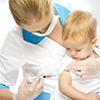 (Aug. 11, 2023) – The Centers for Disease Control and Prevention adopted the CDC's Advisory Committee on Immunization Practices recommendation for the use of nirsevimab (Beyfortus), a long-acting monoclonal antibody in infants and young children under the age of 19 months at high risk of respiratory syncytial virus disease. Nirsevimab, approved by the FDA in July, is administered as an intramuscular injection and is indicated for the prevention of RSV lower respiratory tract disease in neonates and infants born during or entering their first RSV season and children up to 24 months of age at high risk for severe RSV disease through their second RSV season.
(Aug. 11, 2023) – The Centers for Disease Control and Prevention adopted the CDC's Advisory Committee on Immunization Practices recommendation for the use of nirsevimab (Beyfortus), a long-acting monoclonal antibody in infants and young children under the age of 19 months at high risk of respiratory syncytial virus disease. Nirsevimab, approved by the FDA in July, is administered as an intramuscular injection and is indicated for the prevention of RSV lower respiratory tract disease in neonates and infants born during or entering their first RSV season and children up to 24 months of age at high risk for severe RSV disease through their second RSV season.
Nirsevimab has been shown to reduce the risk of both hospitalizations and health care visits for RSV in infants by about 80 percent. The CDC recommends one dose of nirsevimab for all infants younger than eight months born during or entering their first RSV season (typically fall through spring); and for a small group of children between the ages of eight and 19 months who are at increased risk of severe RSV disease, such as children who are severely immunocompromised, entering their second RSV season.
--Karen Braman